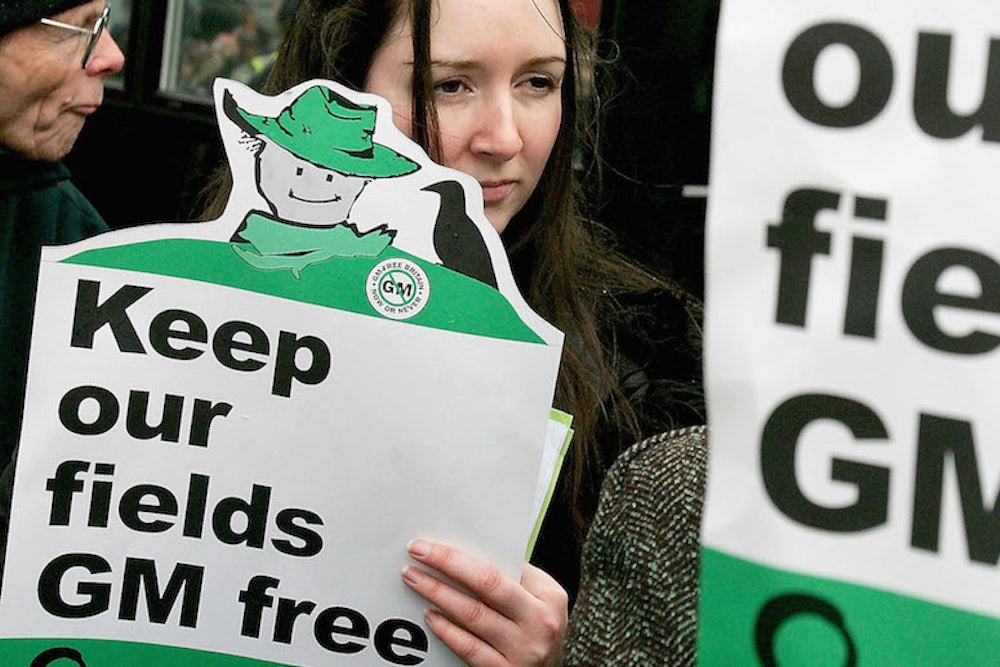In The New York Times on Sunday, Amy Harmon has a long, fascinating, and superbly researched piece about the fight over genetically engineered crops in Hawaii. Harmon follows the journey of a Hawaii county councilman named Greggor Ilagan as he navigates his colleagues and a liberal constituency that are both strongly opposed to the genetic engineering of food. However, as Harmon details while tracing Ilagan's intellectual and scientific discoveries, every single one of the scare stories about genetically engineered crops is untrue; every supposedly scientific study is flawed; and nearly every claim made by opponents is entirely baseless. You really have to read the piece in full to grasp the absolute, utter discrediting of the anti-engineering side, but the article also raises a larger issue. As Harmon writes:
But the groundswell against genetically modified food has rankled many scientists, who argue that opponents of G.M.O.s have distorted the risks associated with them and underplayed the risks of failing to try to use the technology to improve how food is grown. Wading into a debate that has more typically pitted activists against industry, some have argued that opposition from even small pockets of an American elite influences investment in research and the deployment of genetically modified crops, particularly in the developing world, where hunger raises the stakes.
“Just as many on the political right discount the broad scientific consensus that human activities contribute to global warming, many progressive advocacy groups disregard, reject or ignore the decades of scientific studies demonstrating the safety and wide-reaching benefits” of genetically engineered crops, Pamela Ronald, a professor of plant pathology at the University of California, Davis, wrote on the blog of the nonprofit Biology Fortified.
It's this last question, with the comparison between global warming deniers and progressive anti-engineering groups that is fertile. Or, as Harmon goes on to note:
Scientists, who have come to rely on liberals in political battles over stem-cell research, climate change and the teaching of evolution, have been dismayed to find themselves at odds with their traditional allies on this issue. Some compare the hostility to G.M.O.s to the rejection of climate-change science, except with liberal opponents instead of conservative ones.
How fair is this comparison? On first glance there appear to be some distinctions worth making. Global warming is potentially an existential threat to humanity, while genetic engineering of crops is not. Liberals who oppose genetic engineering have not engaged in the same type of smear campaigns against engineering supporters, and modern liberalism doesn't pride itself in the same way on the rejection of mainstream science. And yet, as Harmon details, liberal activists have engaged in scaremongering and making wild claims, sometimes often about engineering companies. And although genetic engineering may not be on par with the survival of the human race, it is potentially an issue with huge implications for global hunger and malnutrition. (As Harmon writes, "In the Philippines, protesters, citing safety concerns, ripped up a test field of rice genetically engineered to address Vitamin A deficiency among the world’s poor.")
But this still leaves one vast difference. This story, a news piece which is also pleasingly one-sided (as the evidence demands), is appearing in the most important liberal publication in the country. The liberals who rant about genetically modified food may be pushing a point of view that is objectively as crazy as believing carbon emissions are not causing global warming; but liberals are still more likely (and willing) to get their news from places that tell them the truth. For conservatives who like to claim that Fox News is just a conservative version of The New York Times, ask yourselves this: Could you imagine Fox News running a big, one-sided piece that overwhelmingly discredited global warming deniers? Of course not. (The Times ran another excellent genetically modified food piece last year, also written by Amy Harmon.)
This probably goes some way in explaining why the modern Republican Party and conservative movement frequently seem so much crazier than mainstream liberalism. It's not that people are simply and inherently crazy; they also operate from within crazy bubbles, which is arguably just as dangerous. For this reason, my guess is that over time liberal opposition to genetic engineering will fade away. I wish the same could be said about right-wing opposition to any type of scheme for containing carbon emissions.
